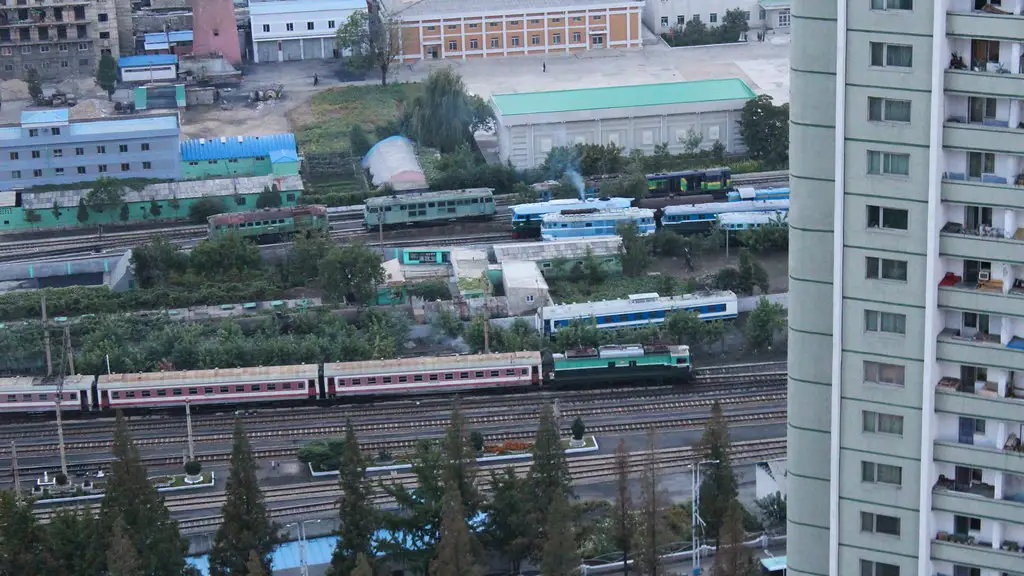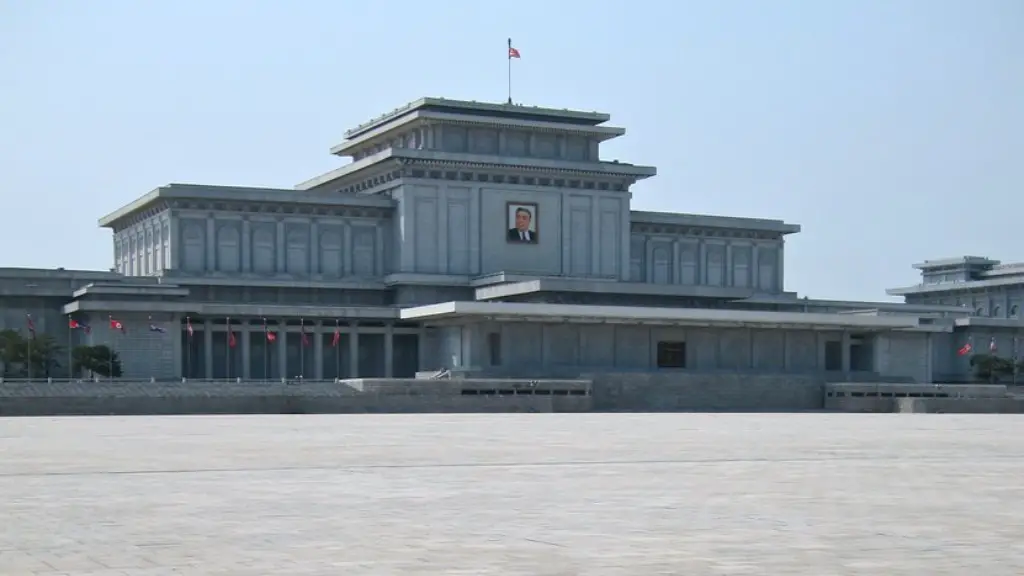Political and Economical Reasons for North Korea’s Crazy Behaviour
North Korea is an authoritarian, socialist state that is considered one of the most isolated and secretive countries in the world. It has been ruled by the same family for over 70 years and is often hailed as a pariah nation. Its aggressive nature and development of nuclear weapons have earned it the title of “Crazy North Korea”, yet there are a few hidden dimensions to North Korea’s behaviour that can help explain why it is so crazy.
Analysts point to the long-standing insecurity of the North Korean regime, which has been in power since 1948, as a key factor in understanding North Korea’s behaviour. Since the establishment of the regime, North Korea has faced a number of security threats from its neighbour, South Korea, and beyond. This internal insecurity means that North Korea has turned to military strength and nuclear weapons as a means of protection from threats. As a result, North Korea’s leaders have enacted a “military first” policy, and in 2018 the nation’s defence budget increased by 3.7 percent.
The economic dystopia inside North Korea also contributes to its craziness. The nation suffers from crushing poverty, poor access to basic amenities such as electricity, shortages of food and medicine, and wide-spread human rights abuses. In a report from the UN Human Rights Office, it was estimated that over 70 percent of the population faced severe food insecurity in 2018, while nearly 66 percent of the population lacked access to an adequate supply of safe drinking water. These deplorable conditions have left North Korea’s people unable to withstand regular wars or long-lasting unrest, therefore making the nation’s desires for security all the more urgent.
Political oppression is also a factor in North Korea’s behaviour. Political party representatives have heavily censored news and information within the country, as well as ensuring that dissent is forcefully silenced. This paranoia and fear of potential threats has caused North Korea to become even more isolated and unpredictable, leading to its craziness.
Relationship Between the US and North Korea
The relationship between the US and North Korea is a significant source of North Korea’s craziness. The US has continually imposed economic and financial sanctions on North Korea in an attempt to force denuclearisation, leading to a deep antagonism between the two nations.
North Korea’s leaders have viewed America’s sanctions as a form of economic warfare that has led to significant suffering for the nation’s people. This has fuelled North Korea’s desire to develop a nuclear programme as a way to gain leverage in negotiations with America, as well as to dissuade any potential military invasions. The US has responded to this aggression with more sanctions, further heightening the nation’s fears and paranoia.
In recent years, the leadership of North Korea and the US have held tense meetings and negotiations, yet due to the complicated history between the two nations, the overall relationship remains somewhat strained.
China’s Role in North Korea’s Crazy Behaviour
China has long been an important ally of North Korea, providing both political and economic assistance to the nation. This support is a double-edged sword, however, with North Korea’s dependency on China leading to a certain amount of resentment. In addition, China’s vast economic and political influence does not come without a price, with its strong stance against North Korea’s nuclear weapons programmes fuelling mistrust in the nation’s leaders.
The unpredictable nature of North Korea’s leadership can also be partly attributed to Chinese pressure. With China looking to maintain stability in the region, it may use its leverage over North Korea to curb its aggressive behaviour. As such, North Korea’s leaders may rely heavily on flexing their military might as a way of deterring any potential conflict with China.
Effects of Unpredictability in North Korea
The unpredictability of North Korea’s behaviour has had a significant effect on the nation’s relationship with other countries. North Korea’s threats of nuclear war and its defiant rhetoric towards other nations have stoked fears around the world. As a result, its actions are met with severe backlash on the international stage, resulting in heavy sanctions and isolation from the global community.
This isolation has left North Korea stuck in its own madness, unable to freely interact and develop relationships with other nations. In the long run, it is likely that these poor relationships will lead to a more unpredictable and unstable North Korea, which could be detrimental to global stability.
International Reputation of North Korea
The reputation of North Korea is one of insanity and unpredictability, with the nation often viewed as a rogue state due to its disregard for international laws and standards. This reputation has been largely earned due to North Korea’s long-standing refusal to abide by international sanctions and its development of nuclear weapons. North Korea’s leaders have also embraced anti-American rhetoric, referring to America as a “satanic force”, while their continued threat of nuclear war has raised alarm bells in nations around the world.
In light of these alarming actions, North Korea has been subjected to a number of UN resolutions aimed at curbing its nuclear ambitions. Unfortunately, these actions have had little success and North Korea remains a highly unpredictable state.
Possibility of Resolving the North Korean Crisis
Since North Korea’s behaviour is determined by its internal insecurity and paranoia, it is difficult to resolve the current crisis. This is complicated further by the nation’s relationship with other states, such as the US, China, and South Korea.
In order to build a lasting peace with North Korea, it is necessary to work on building a level of trust between the nation and other states, as well as rebuilding the nation’s relationship with international organisations. This can be achieved, in part, by reforming the current economic and political systems in North Korea, so that its people can have access to basic amenities and rights.
The UN could also be a key player in resolving the crisis, with its sanctions proving somewhat effective in pressuring North Korea to change its behaviour. International pressure could also be used to ensure that the nation sticks to its commitments, with any breaches of agreements being met with swift and decisive action.
Foreign Policy Changes Necessary to Deal with North Korea’s Crazy Behaviour
In order to effectively deal with North Korea’s crazy behaviour it is necessary to implement a comprehensive foreign policy. This should involve close cooperation between key stakeholders, such as the US, South Korea, China, and the UN, to ensure that the nation’s actions are met with a unified response.
It is also important to engage with North Korea directly in order to ease tensions and rebuild the trust necessary for a peaceful resolution. Any diplomatic process should be pursued cautiously, however, as North Korea may use any negotiations as a way of buying time in order to further develop its nuclear arsenal.
Economic sanctions have also had success in pressuring North Korea to change its behaviour, and if managed correctly, may lead to greater long-term stability in the region. In addition, other incentives such as trade agreements and foreign aid should also be explored as potential ways of motivating North Korea to make reforms.
Psychological Affects of North Korea’s Isolation
The long-standing isolation of North Korea has had a major psychological effect on its leaders and people. The cult-like environment has made it difficult to trust outsiders, while its fears of external threats have created an atmosphere of paranoia and suspicion.
North Koreans are constantly bombarded with propaganda from the state and forced to speak in a specific, political way. This, combined with the lack of alternatives, can create a feeling of helplessness that can greatly impact how the nation and its citizens view the outside world.
Naturally, the isolation imposed by North Korea’s rulers has taken its toll on many people in the nation. The psychological effects of this self-imposed exile are likely to remain for some time, making it difficult to break from the nation’s cycle of craziness.
Lack of Resources in North Korea
The lack of resources and amenities within North Korea has resulted in little to no exposure to modern technology and the internet. This has further exacerbated North Korea’s isolation and prevented its citizens from engaging in discourse with people outside the nation’s borders.
This lack of access to outside opinions and ideas has only further entrenched North Korea’s position as a closed and secret society, making it all the harder for the nation to move away from its craziness. In addition, the effects of the nation’s hermit status are likely to be felt for generations, limiting the opportunities of future generations.
In order for North Korea to flourish, it is necessary for it to open up to the outside world and engage in the international community. Developing relationships with other countries and experimenting with policy reforms can greatly reduce the nation’s craziness, while also providing its citizens with access to essential resources and services.
Changing North Korea’s Image
The image of North Korea around the world as an aggressive and unpredictable nation has been reinforced through years of news reports, books and films. As such, the nation is often viewed as a caricature rather than an actual place with human beings, resulting in a misunderstanding of the nation’s actions and reasonings.
In order to change the public’s views of North Korea, countries must strive to present a more nuanced picture of the nation and its leadership. This can be achieved, in part, by offering more opportunities for dialogue and diplomacy, as well as engaging with North Korean people directly through people-to-people programmes.
It is also important to amplify positive stories from North Korea, such as its rich cultural traditions and innovative solutions to the nation’s problems. This may encourage people to think deeper about the country’s motivations and open up a much-needed dialogue about how to move forward.


